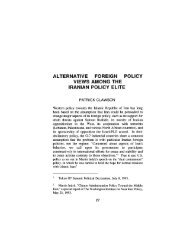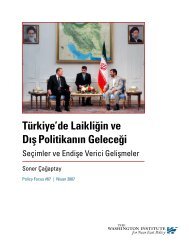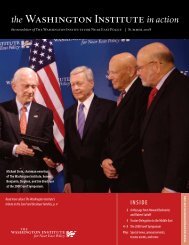Michael Eisenstadt David Pollock How the United States Benefits ...
Michael Eisenstadt David Pollock How the United States Benefits ...
Michael Eisenstadt David Pollock How the United States Benefits ...
You also want an ePaper? Increase the reach of your titles
YUMPU automatically turns print PDFs into web optimized ePapers that Google loves.
Israel’s rocket and missile defenses enable Israel to<br />
act with restraint in <strong>the</strong> face of rocket and missile<br />
attacks, making escalation and war less likely. Thus,<br />
<strong>the</strong> successful intercept of rockets fired from Gaza<br />
by <strong>the</strong> Israeli Iron Dome system in <strong>the</strong> spring and<br />
summer of 2011, and again in <strong>the</strong> spring of 2012, has<br />
averted (at least thus far) a conflict in Gaza that could<br />
have jeopardized U.S. ties with Egypt and sparked a<br />
regional crisis at a particularly sensitive time. 32<br />
The <strong>United</strong> <strong>States</strong> and its allies also stand to<br />
benefit from Israel’s rocket-defense R&D efforts,<br />
which have produced two systems: Iron Dome<br />
(operational) and <strong>David</strong>’s Sling (under development),<br />
both of which offer capabilities that no o<strong>the</strong>r<br />
country in <strong>the</strong> world currently possesses. The Israeli<br />
firm Rafael developed <strong>the</strong> Iron Dome system on<br />
its own—<strong>the</strong> world’s first combat-proven counterrocket<br />
and mortar system—and has partnered with<br />
Ray<strong>the</strong>on to produce it for U.S. allies (South Korea<br />
has reportedly expressed interest) and perhaps for<br />
<strong>the</strong> U.S. military. These kinds of partnerships provide<br />
jobs and help preserve <strong>the</strong> U.S. defense-industrial<br />
base at a time of reduced defense spending,<br />
and provide U.S. and allied forces with a rocketdefense<br />
capability that <strong>the</strong>y currently lack. 33 Likewise,<br />
<strong>David</strong>’s Sling is being jointly developed by<br />
Ray<strong>the</strong>on and Rafael to meet U.S. and Israeli operational<br />
requirements, and might be procured by<br />
<strong>the</strong> U.S. military to enhance its ability to deal with<br />
rockets, short-range missiles, and eventually cruise<br />
missiles and o<strong>the</strong>r air-breathing threats in <strong>the</strong> Persian<br />
Gulf and elsewhere. Several o<strong>the</strong>r U.S. allies,<br />
including India, Singapore, and South Korea, have<br />
likewise reportedly shown interest in <strong>the</strong> system. 34<br />
Looking to <strong>the</strong> future, U.S.-Israel rocket- and<br />
missile-defense cooperation is likely to deepen even<br />
fur<strong>the</strong>r. The <strong>United</strong> <strong>States</strong> continues to support and<br />
remains engaged in <strong>the</strong> development of <strong>the</strong> Arrow<br />
III system, and both Israeli and U.S. companies are<br />
working on solid-state lasers as <strong>the</strong> “next big thing”<br />
in missile defense, creating likely future opportunities<br />
for fur<strong>the</strong>r collaboration. 35 Moreover, <strong>the</strong><br />
<strong>United</strong> <strong>States</strong> and Israel are expected to hold <strong>the</strong><br />
rescheduled Austere Challenge 12 missile-defense<br />
<strong>How</strong> <strong>the</strong> <strong>United</strong> <strong>States</strong> <strong>Benefits</strong> from Its Alliance with Israel<br />
exercise in October 2012, which will involve Israeli<br />
Iron Dome and Arrow missiles, and U.S. Theater<br />
High-Altitude Area Defense (THAAD) and Standard<br />
SM-3 missiles—and more than four thousand<br />
troops from both countries. 36 And for <strong>the</strong> immediate<br />
future, only Israeli rocket-defense systems (Iron<br />
Dome and, in ano<strong>the</strong>r year, <strong>David</strong>’s Sling) provide<br />
a solution to <strong>the</strong> short- and medium-range rocket<br />
threat in <strong>the</strong> region, which affects U.S. personnel in<br />
Iraq and Afghanistan, and U.S. allies in <strong>the</strong> Persian<br />
Gulf and elsewhere.<br />
Military Cooperation<br />
Israel has made a number of important contributions<br />
to <strong>the</strong> American way of war, despite <strong>the</strong> fact<br />
that <strong>the</strong> U.S. military can draw on incomparable<br />
human and material resources, has an unparalleled<br />
record since World War II of technological, organizational,<br />
and doctrinal innovation, and possesses<br />
unrivaled power-projection capabilities. Because<br />
of <strong>the</strong> IDF’s small size, egalitarian culture, relative<br />
lack of bureaucracy, and rich operational experience,<br />
it has been a leading innovator in a number<br />
of critical areas. 37 Accordingly, <strong>the</strong> U.S. military<br />
has often looked to its Israeli counterparts for lessons<br />
learned, innovative technologies and tactics,<br />
and novel warfighting concepts—just as <strong>the</strong> IDF<br />
has frequently looked to <strong>the</strong> U.S. military as a<br />
model and source of inspiration due to <strong>the</strong> latter’s<br />
achievements in <strong>the</strong> 1991 Gulf War, Kosovo (1999),<br />
Afghanistan (2001), and Iraq (2003). 38<br />
Although <strong>the</strong> U.S. military has accumulated<br />
unmatched experience of its own in Iraq and<br />
Afghanistan during <strong>the</strong> past decade, it continues<br />
to consult with its Israeli peers (as well as its British,<br />
Australian, and o<strong>the</strong>r first-tier allies), while<br />
sharing its own insights with <strong>the</strong>m. And although<br />
both sides have occasionally withheld <strong>the</strong>ir most<br />
sensitive tactics, techniques, and procedures or<br />
“game changing” technologies (with Israel, for its<br />
part, fearing that such material would eventually<br />
make its way to Arab states allied with <strong>the</strong> <strong>United</strong><br />
<strong>States</strong>), <strong>the</strong> collaboration has been intimate, far<br />
reaching, and mutually beneficial.<br />
The WashingTon insTiTuTe for near easT Policy 13













